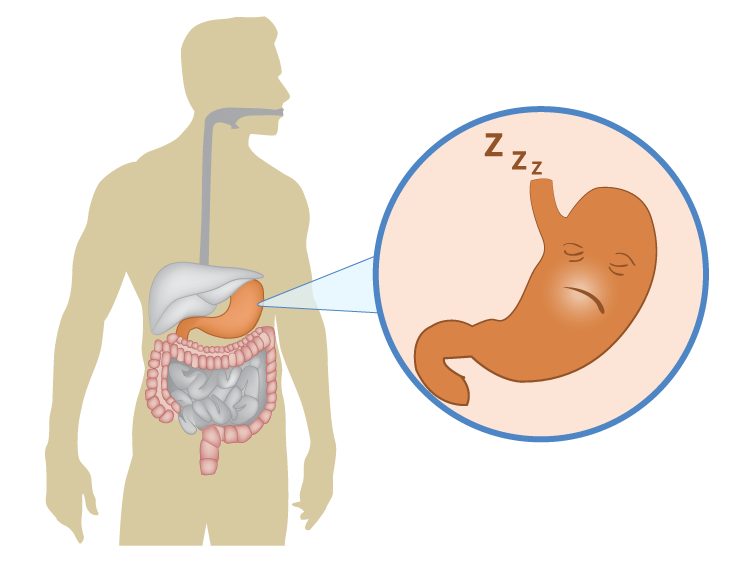Gastroparesis

Gastroparesis occurs when the muscular contractions that ordinarily move food through the digestive tract don’t function correctly, preventing the stomach from emptying properly.
Symptoms
Early signs indicating gastroparesis are:
- Feeling full quickly when eating
- Nausea or vomiting
- Bloating
- Abdominal pain
- Heartburn
- Fluctuation in blood sugar levels
Causes
In many cases, gastroparesis is idiopathic, meaning that the cause is unknown, even after testing.
In cases where a source can be identified, common causes are:
- Diabetes
- Intestinal surgery that might affect the vagus nerve
- Nervous symptom diseases, such as multiple sclerosis or Parkinson’s
- Connective tissue disorders, such as Scleroderma
- Auto-immune disorders
Sometimes the symptoms of gastroparesis are due to:
Side effects from medicines such as
- Narcotics
- Tricyclic antidepressants
- Cardiovascular medications
- Clonidine (for high blood pressure)
- Dopamine agonists (medication for Parkinson’s)
- Lithium
- Cancer medications
Eating disorders
Symptoms often subside when medicines are discontinued or food intake normalizes.
Women are more likely than men to have gastroparesis.
Diagnosis
Doctors can diagnose gastroparesis by:
- Taking a medical history
- Performing a physical exam
- Performing diagnostic tests, such as an ultrasound, endoscopy, or gastric emptying scintigraphy or capsule endoscopy
Treatment
A treatment plan depends on the underlying cause for the condition. For those with diabetes, controlling blood sugar levels is essential for managing symptoms and for overall health.
Treatment may not cure, but can manage the symptoms of gastroparesis. Typically, doctors recommend dietary changes, prescribe medications or recommend other interventions. In some particularly severe instances surgery may be recommended.
DIETARY CHANGES
- Avoid foods that are fatty, spicy, acidic and contain nondigestible fiber
- Avoid carbonated beverages and alcohol
- Choose foods that are low-fat and contain only soluble fiber
- Chew food thoroughly before swallowing. If necessary, food may be blenderized or strained.
- Eat smaller, more frequent meals
- Drink plenty of water
MEDICATIONS Common medicines prescribed for gastroparesis are:
- Metoclopramide (Reglan) helps by stimulating stomach muscles to empty food from the stomach, while reducing nausea and vomiting.
- Erythromycin, an antibiotic, may increase stomach contractions to help with gastric emptying.
- Anti-nausea medications are used to help control nausea and vomiting.
Complications
It is important for patients with gastroparesis to carefully manage their symptoms. Complications can include
- Malnutrition from low calorie intake or inability to absorb nutrients
- Dehydration from frequent vomiting
- Bezoars, a hardening of indigestible material that forms a mass in the digestive tract that may cause nausea, vomiting or obstruction.
- Blood sugar fluctuations in patients with diabetes
- Gastroesophageal reflux disease (GERD), which can lead to esophagitis
If you have any symptoms which have you concerned, our office can help. Call (706) 868-0104 for more information.
The content on our website is for informational purposes only, and is not intended to diagnose or treat any medical conditions. Always seek the advice of your physician with any questions you may have regarding your health.
